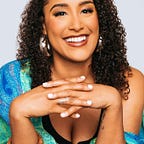I'm Black and Palestinian, you scared?
Growing up in Hawaii, I had never really connected let alone learned about my Palestinian heritage, in spite of it being a part of my last name. When I got the opportunity to study there on Harvard’s dime that all changed. I met some incredibly resilient, beautiful, peaceful, warm and loving people. The exact ANTITHESIS of what US media portrays about the “Arab trope” in the states. All I had heard growing up was public narratives that perpetuated skepticism about how Arabs, especially Palestinians, are perpetual foreigners or terrorists. These stereotypes promoted self-hatred, and were harmful to say the least.
In high school my favorite teacher was a white Jewish male. He taught AP English and I loved the structure, autonomy and ethic of humor he espoused in his class. So much so that I became his teaching assistant my senior year. I remember when I had him sign my yearbook he jokingly wrote “I’m so glad I'll no longer have to live in the fear everyday that you’ll bomb the buildings” 😥. I had no idea what he was talking about. Why would he say that? It caught me so off guard and I just laughed it off. This was one of the first times I realized that having Palestinian heritage in America wasn’t safe. Given that I had no context at the time, I minimized my discomfort and chalked it up to his facetious personality. When my mom got mad I told her she was overreacting. He didn’t mean any harm by it, I contested her on his behalf. So quick to protect his intentions, and overlook my own feelings. It wasn’t until coming to grad school that I’ve realized how much I’ve internalized that “joke”. Will other people automatically assume I’m some terrorist, or that I’m colluding with some “ominous radical group” if I speak out on Palestine?
Or worse, the usual and all too recycled gaslighting tactic, will they deem me “anti-Semitic”?
We see this reality play out day after day in American news, on college campuses, in public and private sectors. The active imbalance in public education around the Nakba, and the hypersensitivity around the memory of the Holocaust, with absolute ZERO space for discussion to address the forced removal of 700,000 Palestinians from their homes as a result, manifests in a public that has NO TOOLS to engage in culturally competent conversations on one of the most pressing contemporary issues of our time. How one broken people created another fractured diaspora. How Jarred Kushner and Trump being close friends with the Prime Minister Of Israel, Netanyahu, is no coincidence.
Violence committed against any people is intolerable.
If Germany provided monetary reparations for those ills, is it too wild for us to even consider America providing reparations to Black people? Where is the public discourse to engage these conversations? And what about the right of return for Palestinians?
I’ve received micro-aggression after micro-aggression growing up. I’ve gotten the “you’re pretty for a black girl” way more times than I’d like to count. Or the “wow, you’re so articulate” as though I somehow, for some reason or another, should not be intelligent. The compliments shrouded in anti-Black colorism also have surfaced, too. Lack of discussion on this topic reinforces American xenophobia, further wedging separation and division within our communities.
Truth is, whether I speak or choose to remain silent people still may, or may not pigeonhole me into all of those categories; false depictions that rip apart the spirit rather than honor our collective humanity. Audre Lorde reminds me that my silence will not protect me. It never protects any of us. I’m so glad that my ancestors did not remain silent, so that I can be here today.
I don’t claim to know what it’s like to grow up under military occupation, or the struggle of not having enough water or electricity for ones basic necessities. I don’t speak Arabic and can only hope to one day learn how to make some of that delicious food. I acknowledge my American privilege, and the distances that exists because of it. Yet I also acknowledge the responsibility I have to tell my truth. Which includes my interactions with Afro-Palestinians. Black people EVERYWHERE, it doesn’t matter where you are — Brasil, US, Argentina, Israel, Palestine, Germany, etc — are degraded, berated and deemed inferior. White supremacy is a disease manifested in the collective consciousness of global society. None of us are free until Black womyn and femmes are free.
© 2021 Azmera Hammouri-Davis; All Rights Reserved
*Since publishing, this piece has been updated and published on Mondoweiss. Read updated piece here.
